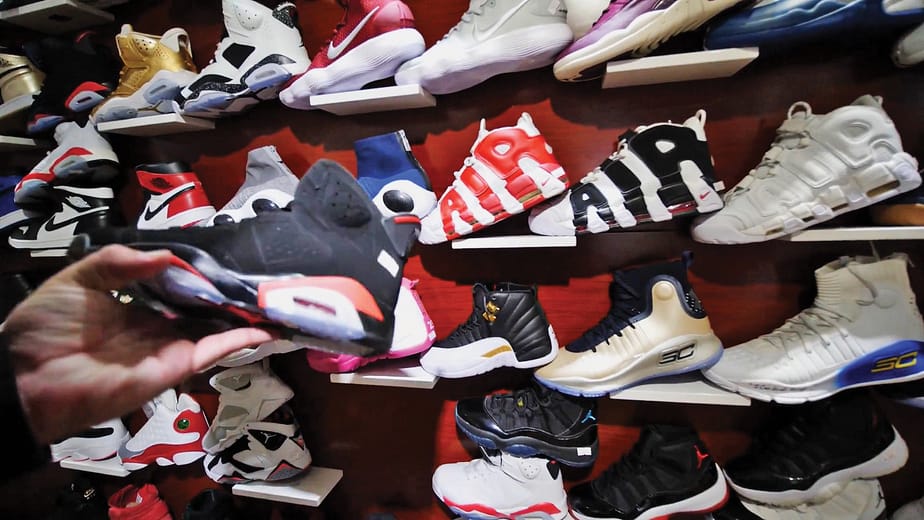The ‘first copy’ looks just like the original brand. The ‘second copy’ has a similar-sounding tag. Delhi’s grey market flourishes
Nike’s advertisements are inspiring. People at their fittest, running and playing, wearing the coveted sneakers. But these shoes can set you back by anywhere from Rs 10,000 to Rs 20,000 for a pair of Jordans – legendary basketball player Michael Jordan’s collaborative line with Nike.
So, what do Delhi’s young who don’t have corporate jobs or overly generous parents do? They land up at Palika Bazaar in Connaught Place or Ghaffar Market in Karol Bagh.
Enter the dungeon that is Palika Bazaar and the stale underground air mixed with piss and leather engulfs you. But before one can get somewhat disoriented and walk away, the shopkeepers lure you back, promising the best deal for the best shoes. So, you take a peek.
A ‘second copy’ of a pair of Jordans will cost you about Rs 1,500. But they’ll forcefully drop prices further as you decide to look at other stores.
Here you’ll find Adidas superstar sneakers which retail at Rs 8,000 (originals) for Rs 1,200. Or Nike Presto at 2,500. But you may miss out on the more specific niche ones, like another NBA player LeBron James’ brand, or the Air Force Ones we were after.
These markets get away with selling fakes because their products have a few distinctly different features. Take the sneakers’ tongue, which instead of Reebok may read ‘Reebu’. This gives them immunity from being slapped with a copyright infringement case. ACP Ajay Kumar, District Investigation Unit, Central District, under whose jurisdiction Palika Bazaar falls, told Patriot that this is how shop vendors get away with copying brands.
This is not to say that these shops don’t take a risk by creating a near perfect copy of the branded footwear. These are called the ‘first copies’ which the shopkeepers will happily show when you say you want a “better sneaker” or more bluntly, a twin of the Reebok and not a Reebu.
Just recently, ACP Kumar shares, they received a case of copyright infringement to do with clothing/ shoe brand. Since the matter is under investigation, he refused to divulge anything more. He did say that they were planning a couple of raids in the coming weeks.
Till now, there have been 104 cases of copyright infringement registered in Delhi (data till October 31, 2018). The figures provided by police headquarters shows 115 cases registered in 2017, lower than 159 cases of 2016.
And recently, large companies have won cases in Delhi’s courts. One is Puma and the other, Christian Louboutin’s famous Red Sole.
In the case of Puma, counterfeit products worth Rs 20 lakh were identified and sealed in Sahibabad, Uttar Pradesh, on November 3. In the case of the Louboutin, the Delhi High Court awarded punitive damages of Rs 20 lakh to the French company for infringement of the trademark ‘Red Sole’ design.
Two footwear dealers in Kamla Nagar were found copying the iconic crimson colour which never wears off, perhaps because wearers never wear their precious pair too often or walk anywhere without the red carpet underfoot.

In the suit, which proceeded ex-parte, Justice Yogesh Khanna held that the plaintiff proved that the defendants’ adoption and use of counterfeit registered trademark, trade dress and deceptively similar domain name, unequivocally amounted to infringement of the plaintiff’s registered domain name and trademark.
On the basis of the findings, the court held that the plaintiffs suffered immense loss of goodwill and reputation and hence are entitled to a grant of damages not only in terms of compensatory damages but also in the form of punitive damages.
The court noted that the trader — Ashish Bansal — despite intimation of a case being initiated against him, chose not to contest the case.
In the case of Puma, premises with shoes, clothing and accessories and the paraphernalia to make them were found. Counsel for Puma, Shashi P Ojha, approached the court seeking ex-parte injunction and ex-parte appointment of local commissioner on account of “infringement of trademark”.
On October 29, Ojha approached court saying that the company would suffer irreparable loss and injury, as the defendant was selling goods using the company’s trademark, thus causing substantial loss of business.
Additional District Judge Anil Antil agreed, issuing an order restraining the defendant from “manufacturing, supplying, selling and offering for sale counterfeit goods, including shoes/slipper and other accessories…under trademark Puma logo…or any identical deceptively similar trademark/logo.”
The court also appointed advocate Rajnish Kumar Jha as local commissioner in the case, who found that the premises in Sahibabad had “5,754 packing material labels, 876 shoes” with Puma stickers, among other goods. All the products were counted and seized. The products listed were estimated to have a market value of Rs 20-25 lakh.
In these two cases, the manufacturers and even the sellers were found out. But the sheer number of what is on sale in the capital’s busy markets is exponential. It isn’t like New York where a fake Chanel bag will have to be bought at a back ally for $100, almost as if one were buying drugs. In India, it happens out in the open in legitimate markets, with little fear of the long arm of the law reaching sellers — or even the real manufacturers.
Till the time it does, the brand-conscious customer without money to splurge knows where to buy the much desired sneakers.





